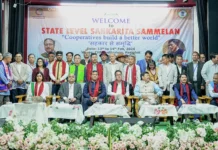NEW DELHI, Sep 1: People left off the National Register of Citizens (NRC) are not “stateless” and will continue to enjoy all the rights as before till they exhaust all the remedies available under the law, the ministry of external affairs (MEA) said on Sunday.
It said exclusion from the NRC has no implication on the rights of an individual resident in Assam, and that they will not be deprived of any rights or entitlements which they have enjoyed before.
The MEA’s comments came in the wake of commentaries in sections of the foreign media about certain aspects of the final NRC, which it said are “incorrect.”
The NRC has been prepared to identify Indian citizens living in Assam since 24 March, 1971, or before.
Out of 3.3 crore applicants, over 19 lakh people were excluded from the final NRC published on Saturday.
“Exclusion from the NRC has no implication on the rights of an individual resident in Assam. Those who are not in the final list will not be detained and will continue to enjoy all the rights as before till they have exhausted all the remedies available under the law,” MEA spokesperson Raveesh Kumar said.
“It does not make the excluded person ‘stateless’. It also does not make him or her a ‘foreigner’, within the legal meaning of the term. They will not be deprived of any rights or entitlements which they have enjoyed before,” he added.
The spokesperson also said that to expedite the process of receiving applications for inclusion, the Assam government is establishing 200 more tribunals, in addition to the existing 100.
Kumar said that anyone excluded from the list at this stage has a right to file an appeal within 120 days of receiving a notification of exclusion to the designated tribunal.
He also said that the Indian government will even assist in providing directions on how to deal with such appeals.
He said the updating of the NRC is a “statutory, transparent, legal process” mandated by the Supreme Court.
He said that the NRC is a fair process based on scientific methods.
“Inclusion in the NRC is a unique process, as it is based on ‘application’ rather than ‘house to house enumeration’. It means that any person in Assam could have sought to be included in the list on the basis of having documentation to prove lineage from an entitled person, ie, a person who was a resident of Assam as on 24 March, 1971,” he explained.
He also stated that it is a non-discriminatory process, which leaves no room for bias and injustice. (PTI)


